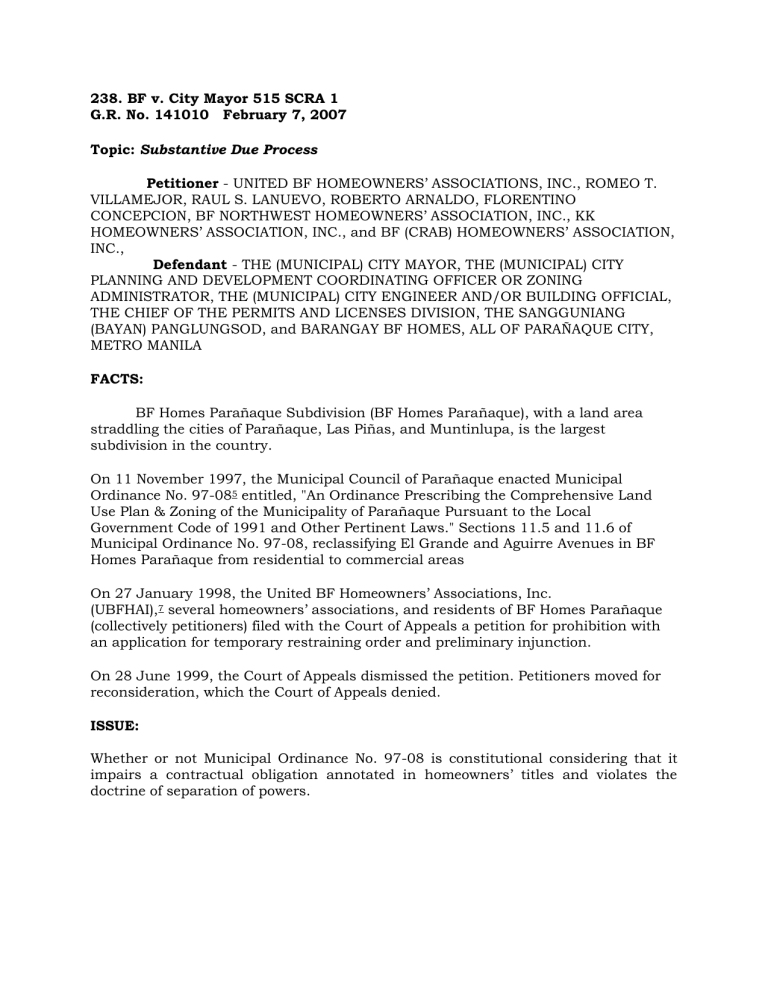
238. BF v. City Mayor 515 SCRA 1 G.R. No. 141010 February 7, 2007 Topic: Substantive Due Process Petitioner - UNITED BF HOMEOWNERS’ ASSOCIATIONS, INC., ROMEO T. VILLAMEJOR, RAUL S. LANUEVO, ROBERTO ARNALDO, FLORENTINO CONCEPCION, BF NORTHWEST HOMEOWNERS’ ASSOCIATION, INC., KK HOMEOWNERS’ ASSOCIATION, INC., and BF (CRAB) HOMEOWNERS’ ASSOCIATION, INC., Defendant - THE (MUNICIPAL) CITY MAYOR, THE (MUNICIPAL) CITY PLANNING AND DEVELOPMENT COORDINATING OFFICER OR ZONING ADMINISTRATOR, THE (MUNICIPAL) CITY ENGINEER AND/OR BUILDING OFFICIAL, THE CHIEF OF THE PERMITS AND LICENSES DIVISION, THE SANGGUNIANG (BAYAN) PANGLUNGSOD, and BARANGAY BF HOMES, ALL OF PARAÑAQUE CITY, METRO MANILA FACTS: BF Homes Parañaque Subdivision (BF Homes Parañaque), with a land area straddling the cities of Parañaque, Las Piñas, and Muntinlupa, is the largest subdivision in the country. On 11 November 1997, the Municipal Council of Parañaque enacted Municipal Ordinance No. 97-085 entitled, "An Ordinance Prescribing the Comprehensive Land Use Plan & Zoning of the Municipality of Parañaque Pursuant to the Local Government Code of 1991 and Other Pertinent Laws." Sections 11.5 and 11.6 of Municipal Ordinance No. 97-08, reclassifying El Grande and Aguirre Avenues in BF Homes Parañaque from residential to commercial areas On 27 January 1998, the United BF Homeowners’ Associations, Inc. (UBFHAI),7 several homeowners’ associations, and residents of BF Homes Parañaque (collectively petitioners) filed with the Court of Appeals a petition for prohibition with an application for temporary restraining order and preliminary injunction. On 28 June 1999, the Court of Appeals dismissed the petition. Petitioners moved for reconsideration, which the Court of Appeals denied. ISSUE: Whether or not Municipal Ordinance No. 97-08 is constitutional considering that it impairs a contractual obligation annotated in homeowners’ titles and violates the doctrine of separation of powers. RULING: The Court has upheld in several cases the superiority of police power over the non-impairment clause. The constitutional guaranty of non-impairment of contracts is limited by the exercise of the police power of the State, in the interest of public health, safety, morals and general welfare. With regard to the contention that said resolution cannot nullify the contractual obligations assumed by the defendant-appellee–referring to the restrictions incorporated in the deeds of sale and later in the corresponding Transfer Certificates of Title issued to defendant-appellee–it should be stressed, that while non-impairment of contracts is constitutionally guaranteed, the rule is not absolute, since it has to be reconciled with the legitimate exercise of police power, i.e., "the power to prescribe regulations to promote the health, morals, peace, education, good order or safety and general welfare of the people." Invariably described as "the most essential, insistent, and illimitable of powers" and "in a sense, the greatest and most powerful attribute of government," the exercise of the power may be judicially inquired into and corrected only if it is capricious, whimsical, unjust or unreasonable, there having been a denial of due process or a violation of any other applicable constitutional guarantee. Our jurisdiction guarantees sanctity of contract and is said to be the "law between the contracting parties," but while it is so, it cannot contravene "law, morals, good customs, public order, or public policy." Above all, it cannot be raised as a deterrent to police power, designed precisely to promote health, safety, peace, and enhance the common good, at the expense of contractual rights, whenever necessary. WHEREFORE, we AFFIRM the Decision dated 28 June 1999 and the Resolution dated 16 November 1999 of the Court of Appeals in CA-G.R. SP No. 46624.

